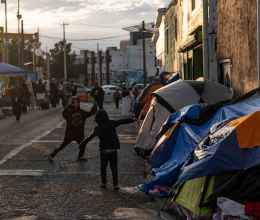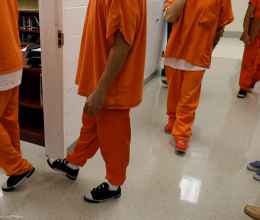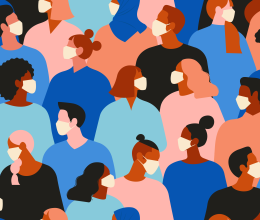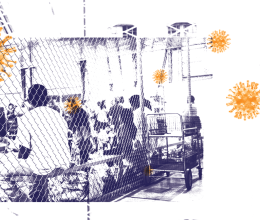
This op-ed first appeared in Florida Politics.
The COVID-19 pandemic has confronted Floridians and the world with a challenge unlike any other we have ever faced.
The increasing number of infections has caused widespread anxiety but has also made it clear that we are all in this together, regardless of race, religion, national origin, social class or political preference.
We must keep those closest to us safe but also act in ways that prevent the spread of the virus to our community as a whole.
To accomplish this, any efforts must include the protection of the most vulnerable in our society.
Among the most at-risk individuals in this crisis are people incarcerated, in both state prisons and county jails. The potential of the deadly virus to spread quickly in such confined conditions is obvious and the possible toll tragic.
Last week, the American Civil Liberties Union (ACLU) of Florida joined other civil rights organizations in publishing an open letter to Gov. Ron DeSantis, urging him to immediately take action to protect some 150,000 people incarcerated in Florida.
We encouraged him to adhere to the recommendations of experts at the Centers for Disease Control and Prevention (CDC), the Florida Department of Health, and the National Commission on Correctional Health Care.
These policies would include: informing incarcerated people and prison staff about the dangers of the virus and measures designed to minimize risks; supplying prisoners with warm water, soap and hand sanitizer; screening not only prisoners but prison employees to ensure they do not introduce the virus behind the prison walls; releasing youth to their families.
Unless a danger to public safety is identified, incarcerated people who are medically fragile, pregnant or elderly — who face the greatest dangers from the virus — should be released.
That policy could also help the Florida Department of Corrections avoid extremely complex and expensive medical care prisoners will need — and will be entitled to receive — if they become infected behind bars.
If incarcerated people do contract the virus, prisons must create separate care areas and treatment for them, in conjunction with the CDC and the nearest hospital.
Any quarantine should be non-punitive — treatment not punishment.
The practice of charging copays for medical treatment, which exists in some prisons, must be discontinued. Additionally, in Florida visitation has been halted to protect people from spreading and being exposed to COVID-19. Incarcerated people and their loved ones should have access to free telephone and video calls so they can continue to be in contact with one another during this uncertain time.
Protection of the incarcerated must also extend to our county jails, which are even more vulnerable to the virus than prisons, due to the greater flow of arrestees on a daily basis.
Most people held in jails have not been convicted of a crime, and most of those have simply been arrested and are unable to post bond. They are innocent until proven guilty and their lives should not be put at risk in our jails.
We have called on the state to act to ensure their health and safety is a priority by releasing pretrial detainees who have not been convicted of a crime and are simply in jail because they cannot afford to pay bail.
Some sheriffs have already released such individuals due to COVID-19 concerns. Hillsborough County released 164 people. Volusia County released 88. Lake County released 44. All other jails should immediately do the same.
It shouldn’t take a global pandemic for courts, state attorneys, and sheriffs to recognize the injustice of unnecessarily keeping people in custody in county jails simply because the individuals cannot afford bail.
The same hygiene procedures and other precautions taken in prisons should be followed in jails. But the dangers confronting the jail population can be drastically reduced by adopting a policy of not incarcerating people who have been charged with misdemeanors and other nonviolent crimes and simply giving them notices to appear in court at a later date, a procedure already used in some cases.
County officials should also divert as many arrestees as possible to drug treatment and mental health services, and avoid putting them in jails.
Another population at great risk during the crisis is undocumented people.
Continuing civil immigration enforcement activities will not only unnecessarily increase the number of people in detention but also drive undocumented people further underground and keep them from seeking medical help when needed. Federal officials should immediately and unequivocally confirm that they are suspending these activities, and our local officials should suspend any contracts with ICE for civil immigration detention bedspace.
We have also been warned to avoid all gatherings of more than 10 people, but, as of last week, hundreds of non-detained people, many who are elderly or use wheelchairs, were lined up outside the office of the U.S. Immigration and Customs Enforcement (ICE) agency in Miramar for regularly scheduled check-in appointments.
ICE had announced that in some cases appointments could be rescheduled, but this only created confusion and a risk to public safety for those who still must report or who are unsure if they must report.
We joined other organizations in urging the agency to postpone those appointments altogether. That is a way of protecting us all.
Another crucial concern during the COVID-19 pandemic is its effect on voting. The expert prognosis is that while the spread of COVID-19 may diminish in time, it may not disappear altogether by the general election in November.
To diminish risk and protect our elections, state and county elections officials should make vote-by-mail ballots available to all voters. We should also eliminate arbitrary voter registration deadlines and extend early voting across the state. In fact, we should allow voters to register and vote even on Election Day, as many other states allow.
As this crisis continues, we may see other civil liberties issues arise. But for now, in the face of this challenge, we must not only protect ourselves and those nearby but also reassess and discard policies that have never served any real public safety or community-strengthening purposes, look out for the most vulnerable, and defend our democracy.







